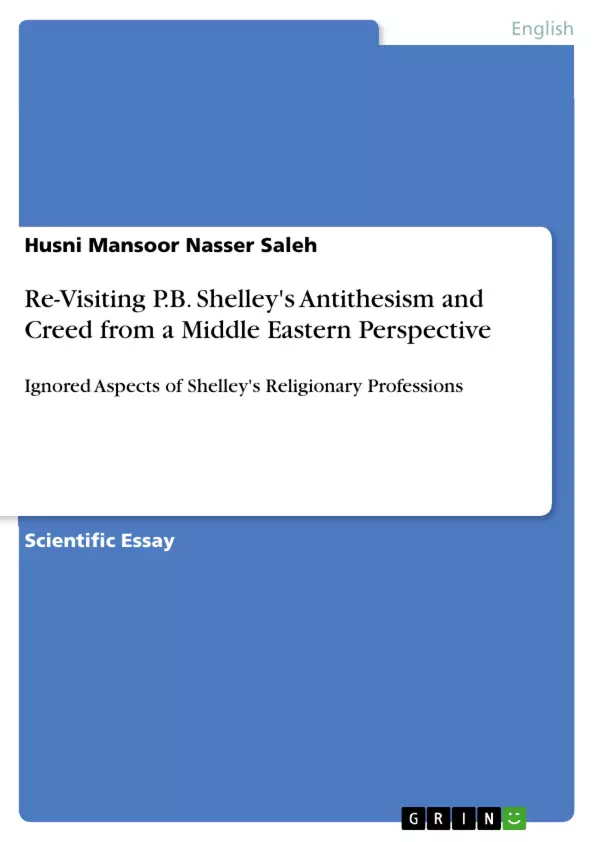Religiosity has probably a definite place in Shelley’s works. He has dealt with various creeds, doctrines and religions. His poems and essays have been partly allocated to directly or indirectly reform religious institutions, re-correct their personal-biased representatives and re-adopt himself to a desired creed. Seemingly he has been occupied in being accused of atheism to the level he called himself an atheist which may mean an antitheist- a contemplator, what others have decided for him, an atheist of a religion that its tops incite committing heinous acts against humanity in the name of God or an allusion in which he means to say if you religiosnism is like what you cruelly act and decadently behave, I consider myself an atheist of that religiosity. He appears to have found his antique clock which he had been seeking for so long in a certain monotheistic belief. The researcher focuses in this study on an overlooked creed in previous studies while other beliefs and creeds may be peeked out. It sheds light through descriptive and analytical approach together with reader’s-oriented response on major characteristics in Shelley’s life, letters and poems together with exposing some different critics’ and researchers’ views.
Inhaltsverzeichnis (Table of Contents)
- Introduction
Zielsetzung und Themenschwerpunkte (Objectives and Key Themes)
This research study examines the religious perspectives of Percy Bysshe Shelley from a Middle Eastern viewpoint. It seeks to delve into Shelley's complex relationship with various religions, beliefs, and doctrines, particularly focusing on a specific creed often overlooked in previous studies. The research aims to shed light on Shelley's beliefs and how he perceived the role of religion in society.
- Shelley's religious perspectives and his engagement with various religions
- The influence of Christianity, Judaism, Islam, Hinduism, Buddhism, and other beliefs on Shelley's work
- Shelley's perception of religious institutions and their influence on society
- Shelley's critique of religious hypocrisy and tyranny
- The complexities surrounding Shelley's atheism and antitheism
Zusammenfassung der Kapitel (Chapter Summaries)
The Introduction explores Shelley's multifaceted engagement with various religions, including Christianity, Judaism, Islam, Hinduism, Buddhism, and other beliefs. It discusses Shelley's critical stance on religious institutions and his perceived hypocrisy within them. The chapter also examines the controversy surrounding Shelley's atheism and antitheism, exploring different interpretations of these labels in relation to his writings and actions.
Schlüsselwörter (Keywords)
The key concepts and topics explored in this research include Percy Bysshe Shelley, religion, religious beliefs, Christianity, Judaism, Islam, Hinduism, Buddhism, atheism, antitheism, religious hypocrisy, religious institutions, and critical analysis of Shelley's work from a Middle Eastern perspective.
- Quote paper
- Husni Mansoor Nasser Saleh (Author), 2018, Re-Visiting P.B. Shelley's Antithesism and Creed from a Middle Eastern Perspective, Munich, GRIN Verlag, https://www.grin.com/document/437785



